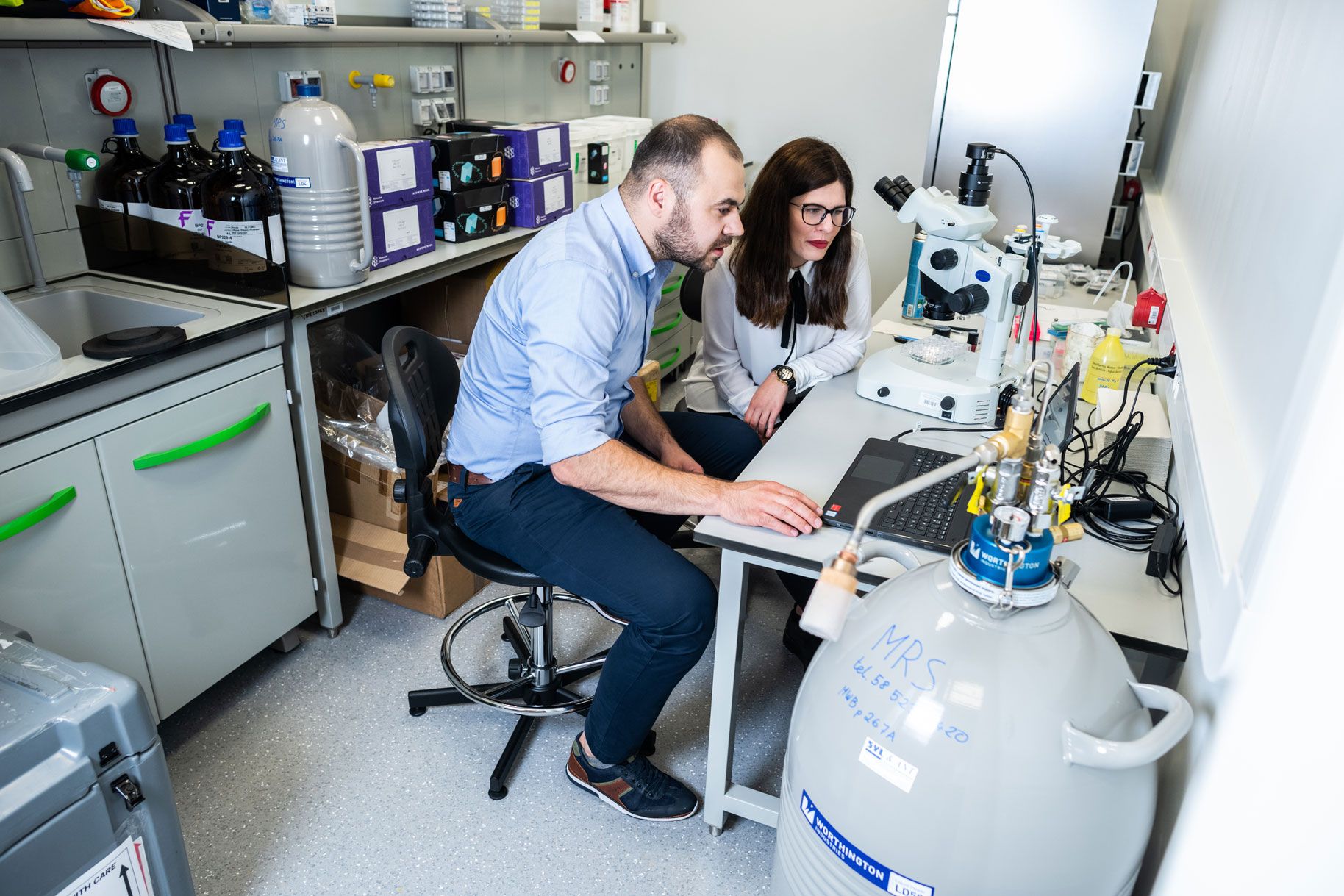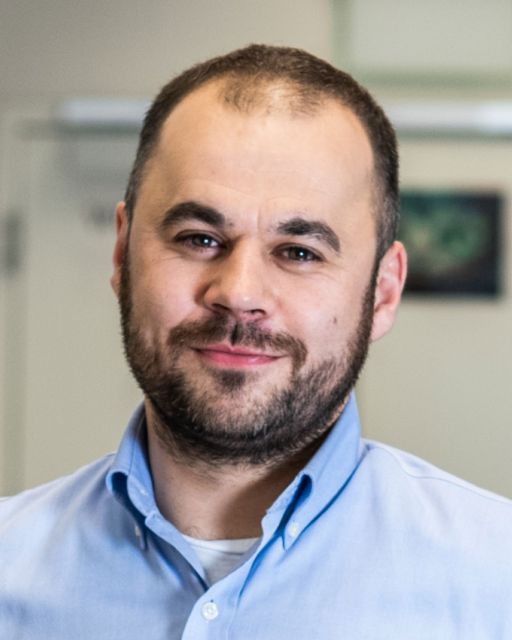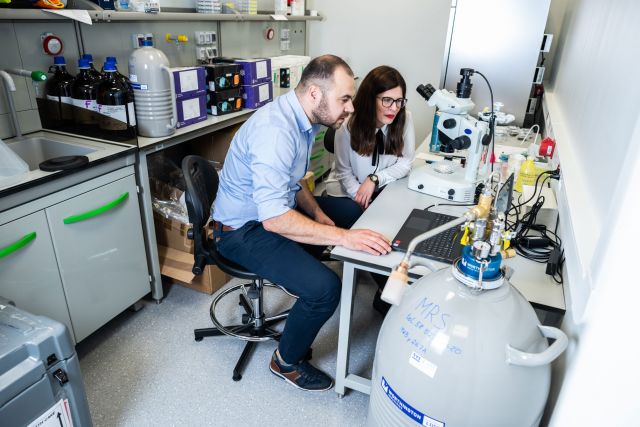Principal Investigator
:
dr hab. Michał Szymański, prof. UG
University of Gdańsk
Panel: NZ1
Funding scheme
: POLONEZ 2
announced on
announced on 15 March 2016
DNA replication, recombination and repair are the most basic, strictly regulated processes coordinated by highly specialized nucleoprotein complexes, also known as “molecular machines” and made up of enzymes with different functions. Our group’s research interests centre on understanding the basic principles that underlie the formation of such multi-protein complexes, describing their structure, and determining their mechanism of action. Knowing how molecular machines copy and repair DNA will allow us to explain how errors in these key processes may lead to cell dysfunction and cause disease.
 Michał Szymański with PhD student Marta Grzelewska. Photo by One HD/ FNP
Mitochondria, often described as the “cell’s power plant”, generate the energy that each cell needs to survive and that our body requires for normal function. They have their own genetic material, known as mitochondrial DNA, which provides a set of precise instructions according to which the building blocks of the “power plant” are made. Any damage to mitochondrial DNA that results in mutation may contribute to mitochondrial dysfunction. Mitochondrial dysfunction, on the other hand, is linked to the processes of aging, as well as many medical conditions, including cancer, metabolic disease (e.g. diabetes), and various neurodegenerative disorders (e.g. Alzheimer’s disease). It turns out that mitochondria have their own set of repair tools, including specialized enzymes that identify and repair damaged mitochondrial DNA. Their mechanism of action, however, is still largely unknown.
Michał Szymański with PhD student Marta Grzelewska. Photo by One HD/ FNP
Mitochondria, often described as the “cell’s power plant”, generate the energy that each cell needs to survive and that our body requires for normal function. They have their own genetic material, known as mitochondrial DNA, which provides a set of precise instructions according to which the building blocks of the “power plant” are made. Any damage to mitochondrial DNA that results in mutation may contribute to mitochondrial dysfunction. Mitochondrial dysfunction, on the other hand, is linked to the processes of aging, as well as many medical conditions, including cancer, metabolic disease (e.g. diabetes), and various neurodegenerative disorders (e.g. Alzheimer’s disease). It turns out that mitochondria have their own set of repair tools, including specialized enzymes that identify and repair damaged mitochondrial DNA. Their mechanism of action, however, is still largely unknown.
The purpose of our project was to provide basic structure-function data to discover the mechanism by which damaged genetic material is identified by enzymes involved in mitochondrial DNA repair. We showed that the enzymes involved in identifying and eliminating DNA damage cooperate with one another, and that the process of identification and repair is stimulated by other proteins still. In addition, the POLONEZ grant allowed us to continue our international cooperation with a group run by Professor Andrew Fire from Stanford University, USA, which led to an article entitled “Transcription polymerase-catalyzed emergence of novel RNA replicons”, published in “Science”. In cooperation with teams from Poland and Slovakia, we described the first case of a homozygous variant of the POLG2 gene in an adult patient. Entitled “Whole exome sequencing identifies a homozygous POLG2 missense variant in an adult patient presenting with optic atrophy, movement disorders, premature ovarian failure and mitochondrial DNA depletion”, our joint article was published in the “European Journal of Medical Genetics”. In addition, the POLONEZ grant helped to generate the preliminary data and ideas for my ERC Starting Grant proposal.
Project title: Unraveling the molecular basis of DNA damage recognition and processing in human mitochondria
dr hab. Michał Szymański, prof. UG
Professor of the University of Gdańsk. He graduated in Biochemistry and Biophysics from the University of Houston (2007), and earned his PhD in Biochemistry and Molecular Biology at the University of Texas (2011). Carried out a Postdoctoral Fellowship at the Department of Biochemistry and Molecular Biology (2011-2013) and Department of Pharmacology (2013- 2016), UTMB, USA. In 2017, as a winner of POLONEZ (NCN) and FIRST TEAM (FNP) grants, he moved to the Intercollegiate Faculty of Biotechnology UG and GUMed (MWB UG-GUMed). Apart from domestic and international grants and fellowships, he has also won the prestigious EMBO Installation Grant and a grant from the European Research Council (ERC). In 2019, he earned his habilitation degree and was appointed as the Head of the Structural Biology Laboratory at MWB UG-GUMed. He has authored more than 25 original articles published in prestigious research journals, such as “Science”, “Nature Communications”, “Proceedings of the National Academy of Sciences of the United States of America (PNAS)”, “EMBO Journal”, “Journal of Biological Chemistry”, and more than 50 conference papers.


